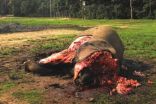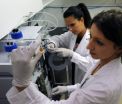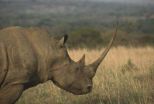(Press-News.org) In 1832 Charles Darwin disembarked from HMS Beagle in Bahia Blanca, Argentina where he travelled by land to Buenos Aires. In Bahia Blanca, Darwin collected several fossils of large mammals along with many other living organisms, including several insects. More than 180 years later on Darwin's birthday, February 12, scientists name after him a long lost but new to science beetle genus and species from this collection.
The beetle was discovered and described by Dr. Stylianos Chatzimanolis, an entomologist at the University of Tennessee at Chattanooga, USA as a new genus and species of rove beetles, a group of insects with more than 57,000 described species. The scientific name for the new species is Darwinilus sedarisi. The genus name (Darwinilus) was given in honor of Charles Darwin, while the epithet (sedarisi) was given in honor of Mr David Sedaris, a USA writer. The study was published in the open access journal ZooKeys.
The specimen collected by Darwin was considered lost for many years at the Natural History of Museum, London, until it was rediscovered in 2008. 'I received on loan several insects from the Museum in London, and to my surprise I realized that one of them was collected by Darwin' said Dr. Chatzimanolis. 'Finding a new species is always exciting, finding one collected by Darwin is truly amazing'.
Only two specimens are known for this new species, both collected before 1935. Despite extensive work by Dr. Chatzimanolis in many major European and N. American museums no other specimens have been found. Most of the habitat where the species is found has been transformed into agricultural fields. 'One certainly hopes that a newly described species is not already extinct'.
INFORMATION:
Original Source:
Chatzimanolis S (2014) Darwin's legacy to rove beetles (Coleoptera, Staphylinidae): A new genus and a new species, including materials collected on the Beagle's voyage. ZooKeys 379: 29-41. doi: 10.3897/zookeys.379.6624
Additional information:
Read more on rove beetles in the author's blog "Rove beetle musings" at: http://xanthopygina.blogspot.com and follow the author on Twitter @schatzimanolis
Lost and found: New beetle collected by Darwin 180 years ago published on his birthday
2014-02-12
ELSE PRESS RELEASES FROM THIS DATE:
Use of mortality as measure of stroke care questioned
2014-02-12
A new study disputes the effectiveness of mortality as a measure of the quality of care provided by hospitals to stroke patients. The paper – which was simultaneously presented today at the International Stroke Conference in San Diego and published in the journal Stroke – found that use of do-not-resuscitate (DNR) orders differ widely between hospitals and that this variation can significantly skew a hospital's quality "ranking" based on mortality.
"With mortality increasingly being used as a marker for the quality of care provided to stroke patients, it is essential ...
"You hide it -- I'll find it!" -- Great tit has a bird's eye view when looking for dinner
2014-02-12
Birds that hoard food for a rainy day better be sure that there are no great tits around to spy on where they hide their reserve of seeds and nuts. So says Anders Brodin and Utku Urhan of the University of Lund in Sweden, who found that great tits can remember the position of such hideaways up to 24 hours after seeing it cached. Interestingly, even though great tits share this mental ability with well-known hoarders such as crows and jays, they do not store up food themselves. The findings appear in Springer's journal Behavioral Ecology and Sociobiology.
Observations ...
New data shows continued decline of African forest elephants
2014-02-12
London (February 12, 2014)—New data from the field in Central Africa shows that between 2002 and 2013, 65 percent of forest elephants were killed. They are being poached, for their ivory, at a shocking 9 percent per year.
This new data marks an update to an earlier paper in the online journal PLOS ONE on the status of forest elephants across Central Africa, published by the same scientists. Many organisations collaborated in the study which covered 80 sites, in five countries, over the twelve years of data collection.
The earlier paper, published in 2013, already had ...
Capillaries will measure diffusion and help in more efficient medical treatment
2014-02-12
How strongly do two dissolved analytes react with each other? Such information is of paramount importance not only in chemistry and molecular biology, but also in medicine or pharmacy, where it is used, i.a., to determine optimal drug doses. A method developed in the Institute of Physical Chemistry of the Polish Academy of Sciences in Warsaw will allow for determining diffusion coefficients of analytes in fluids and equilibrium constants of reactions – quickly, at low cost, and most importantly: universally.
In many medical therapies, a prerequisite for efficient treatment ...
Genetic find might lead to cattle that are more resistant to TB
2014-02-12
Scientists have identified genetic traits in cattle that might allow farmers to breed livestock with increased resistance to bovine tuberculosis (TB).
The study, which compared the genetic code of TB-infected animals with that of disease-free cattle, could help to impact on a disease that leads to major economic losses worldwide.
The research, led by the University of Edinburgh's Roslin Institute, has identified a number of genetic signatures associated with TB resistance in the cows that remained unaffected.
The study builds on previous research by The Roslin Institute, ...
Mindfulness meditation may improve decision making
2014-02-12
One 15-minute focused-breathing meditation may help people make smarter choices, according to new research from researchers at INSEAD and The Wharton School. The findings are published in the February issue of Psychological Science, a journal of the Association for Psychological Science.
People have trouble cutting their losses: They hold on to losing stocks too long, they stay in bad relationships, and they continue to eat large restaurant meals even when they're full. This behavior, often described as "throwing good money after bad," is driven by what behavioral scientists ...
Scientists discover a new pathway for fear deep within the brain
2014-02-12
Cold Spring Harbor, NY – Fear is primal. In the wild, it serves as a protective mechanism, allowing animals to avoid predators or other perceived threats. For humans, fear is much more complex. A normal amount keeps us safe from danger. But in extreme cases, like post-traumatic stress disorder (PTSD), too much fear can prevent people from living healthy, productive lives. Researchers are actively working to understand how the brain translates fear into action. Today, scientists at Cold Spring Harbor Laboratory (CSHL) announce the discovery of a new neural circuit in the ...
Poaching threatens savannah ecosystems
2014-02-12
White rhinoceros may be extinct in twenty years with the current poaching rates. The loss of this megaherbivore is in itself a tragedy, but it may also have tremendous effects on the ecosystems they now live in.
The white rhino (Ceratotherium simum), and other megaherbivores, are key drivers of ecosystem functioning because they´re not controlled by predation.
A new study by Joris Cromsigt and Mariska te Beest, published in Journal of Ecology, highlights the role of the white rhino in the savannah ecosystems.
Earlier empirical studies on the ecosystem impact of megaherbivores ...
Exercise targets cellular powerhouses to improve heart function
2014-02-12
Whether lifting weights in a gym or just walking around the block, exercise has many benefits, such as helping people lose weight and build stronger muscles. Some studies suggest that it may reduce the risk of developing cancer and other diseases. Researchers now report in ACS' Journal of Proteome Research that moderate, long-term physical activity appears to improve cardiovascular health in mice by targeting the heart cells' powerhouses — the mitochondria.
Eduard Sabidó, Francisco Amado and colleagues explain that despite the well-documented benefits of exercise, the ...
How stellar death can lead to twin celestial jets
2014-02-12
Astronomers know that while large stars can end their lives as violently cataclysmic supernovae, smaller stars end up as planetary nebulae – colorful, glowing clouds of dust and gas. In recent decades these nebulae, once thought to be mostly spherical, have been observed to often emit powerful, bipolar jets of gas and dust. But how do spherical stars evolve to produce highly aspherical planetary nebulae?
In a theoretical paper published this week in the Monthly Notices of the Royal Astronomical Society, a University of Rochester professor and his undergraduate student ...





